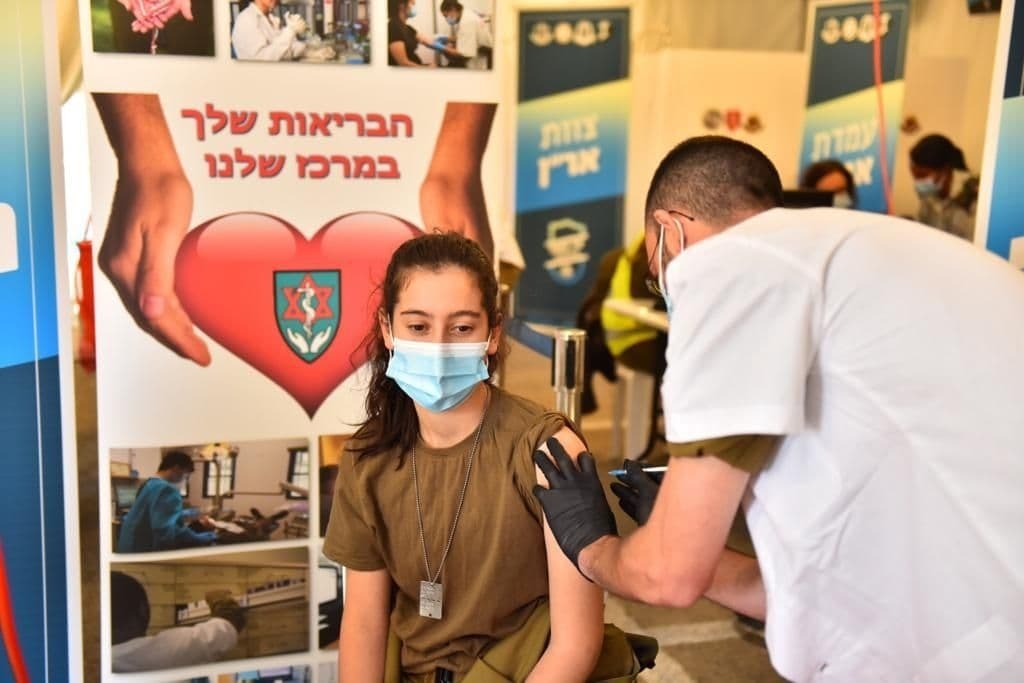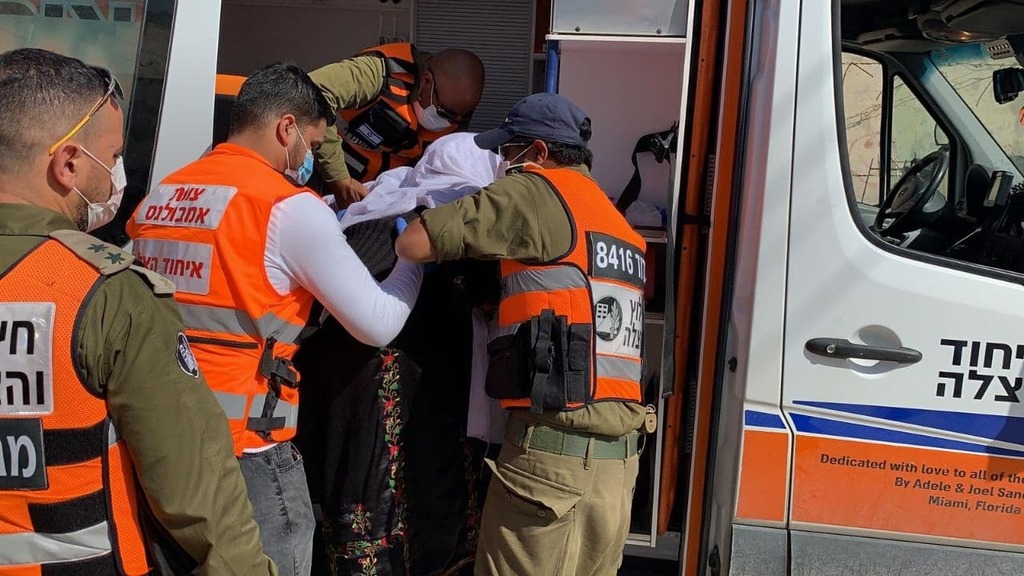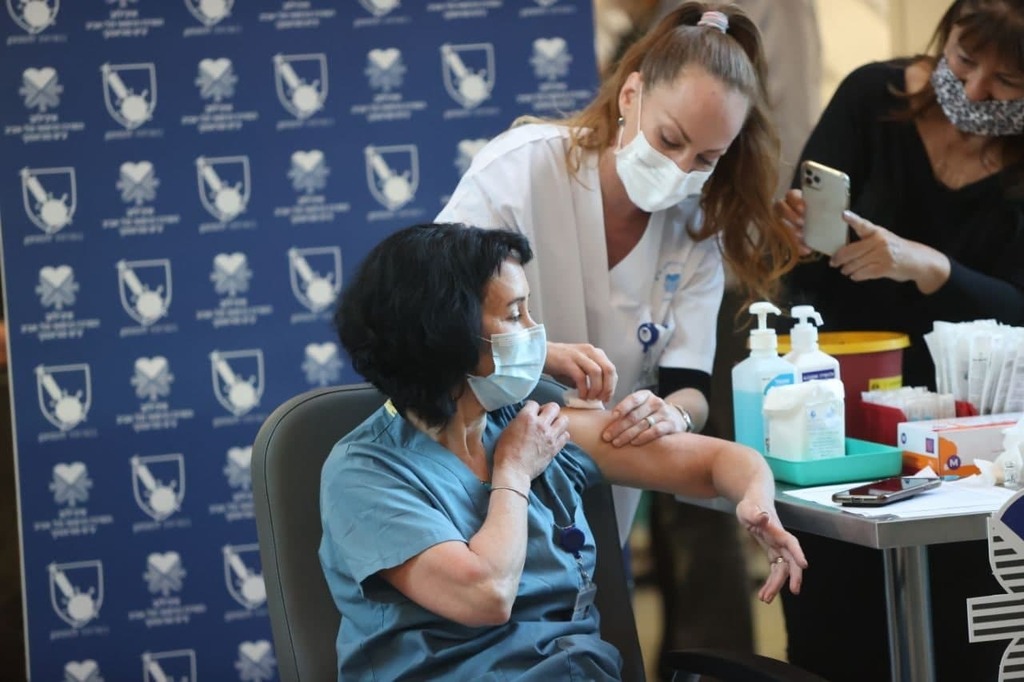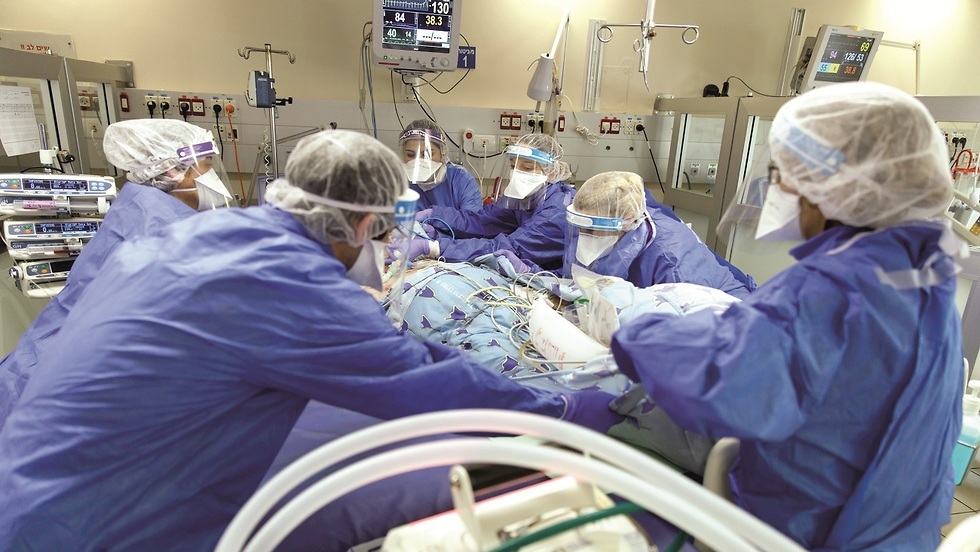Data from the Ministry of Health obtained by Ynet indicates that the coronavirus vaccine is having a dramatic impact on the number of infections and fatalities from the disease in Israel.
Of the 660 people who succumbed to COVID-19 in the period in which the data was collected, just four had been fully vaccinated at least two weeks before their death.
In contrast, 546 of that number had not been vaccinated at all or had only received the first dose in the two weeks or less before their death.
4 View gallery


An IDF soldier receives the coronavirus at Tzrifin military base in central Israel
(Photo: IDF Spokesperson's Unit)
The data highlights a significant downturn in infection rates among the over-60s who were the first to be inoculated with both doses of the vaccine.
Of the 183 coronavirus patients over the age of 60 in critical condition, only one had received the second dose of the vaccine more than two weeks ago.
Similarly, of 856 patients over the age of 60 who are hospitalized in serious condition, just 56 had received the second dose of the vaccine more than a week ago.
Among the 203 patients under the age of 60 who are hospitalized in serious or critical condition, only 10 had had the second dose of the vaccine more than a week ago, and only one had been vaccinated with the second dose more than two weeks ago.
The vaccine has also had a marked impact on the number of people infected with the virus who did not require hospital treatment, according to the data.
Of the 13,075 infected people aged 60 and over who were not hospitalized, 10,724 of them had not been vaccinated at all or had only received the first dose in the preceding 13 days, as compared to 271 patients in this group who had received the second dose more than two weeks ago.
Meanwhile, the Maccabi health fund said: "To date, less than 0.1% of the recipients of the second vaccine dose [through Maccabi] have contracted COVID-19. The vaccine's effectiveness in Israel now stands at 93%. In the past day, only 544 of the 523,000 people who we vaccinated with the second dose more than a week ago have been infected with the virus."
The health fund said that of that 544, only 15 patients needed hospitalization - four people in serious condition, three in moderate condition and eight with mild symptoms.
4 View gallery


IDF troops help deliver vaccines to housebound Israelis
(Photo: IDF Spokesperson's Unit)
The hospitals say this data is in line with what they are seeing on coronavirus wards, namely a sharp decline in the average age of people who are hospitalized and younger patients who were mostly in hospital for the first time in their lives.
"Once upon a time, we hardly saw young people in our wards," says Prof. Idit Matot, director of anesthesia at Ichilov Hospital in Tel Aviv. "Today we are seeing more people under the age of 60 than over."
She added: "Recently we have seen really young people, in their 30s, who have not been vaccinated. We have vaccine information on each patient in hospital - most have either not been vaccinated at all or have not had the second vaccine.
"Currently less than 20% of our patients are over 60 and they have largely not been vaccinated. This is a trend that has been happening for the past two weeks and is only intensifying.
"We are also seeing young people connected to an ECMO [heart and lung] machine - something we have not really seen before. We are witnessing tragedies here and there is nothing that can explain this shift except the vaccine."
4 View gallery


Prof. Idit Matot receives the vaccine at Ichilov hospital in Tel Aviv
(Photo: Moti Kimchi)
Hadassah Medical Center in Ein Kerem, which has seen the heaviest cumulative load since the outbreak of the virus, also points to a dramatic change.
"We have a decrease in the number of patients. It is slow - but it is already unmistakable," says Prof. Dror Mevorach, director of the coronavirus and internal medicine departments at Hadassah Ein Kerem.
"We have less than 100 inpatients whereas before we were over 140. This is a steady trend so I can definitely say that there is a decrease. There is also a drop in the number of patients aged 60 and over, " he said.
"On the other hand, there is an increase in the number of young patients in serious condition. The picture is improving. The intensive care unit for children now has just one patient and we may be able to close one of the wards next week."
The director of Assuta Ashdod Hospital, Dr. Erez Barenboim, repeated the warning that the average age of virus patients has fallen dramatically.
"The coronavirus wards in all the hospitals are seeing older patients replaced by younger ones. I say to the young population - the coronavirus wards are filled with people who have said 'it will never happen'. Go get vaccinated immediately," he said.


